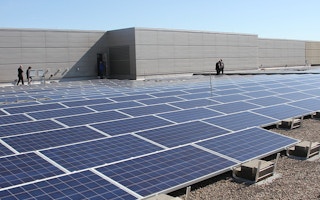Australian energy trading technology firm Power Ledger and Thai company BCPG, a renewable energy business arm of Bangchak Corporation, have jointly launched a new project that will see them set up a marketplace which will allow firms, institutions and individuals across Southeast Asia to sell and purchase renewable energy certificates (RECs).
RECs are tradable commodities which represent proof that one megawatt-hour (MWh) of electricity was generated from a renewable energy resource. They solve the conundrum that it is physically impossible to draw only green electricity from the grid, as it blends in with all the other electricity, including that produced from fossil fuels.
The creation of RECs enables renewable energy generators to sell electricity at market rates, and the “greenness” in the form of certificates. This supports the renewable energy market while helping companies unable to produce power themselves to meet their clean energy needs and offset their carbon footprint.
The new trading platform, which is to kick off this year, builds on Power Ledger’s existing partnership with BCPG. In the first phase, RECs will be generated by four parties already participating in a peer-to-peer (P2P) renewable energy trading platform the two companies launched at the T77 urban precinct in Bangkok two years ago.
They include a shopping centre, an international school, serviced apartments and a dental hospital. All are fitted with solar panels, which boast a total capacity of 635 kilowatts and have been buying and selling excess electricity among each other since 2018.
The process of issuing, trading and retiring RECs will be recorded by Power Ledger’s blockchain-based digital energy platform, which was developed in collaboration with joint venture Thai Digital Energy Development (TDED), through an integrated online system. Retiring certificates means they are taken out of circulation when a party has claimed their environmental benefits.
“Just like buying a concert ticket, organisations want to ensure any REC purchased hasn’t already been used, as well as settling that transaction quickly,” said Power Ledger co-founder and executive chairman Dr Jemma Green. “Power Ledger’s blockchain-enabled technology provides a secure and accountable platform that can audit and streamline the buying and selling of renewable energy.”
Green told Eco-Business that several power-generating condominiums in the Thai capital would join the marketplace in 2021, and that the platform was also planning to get other power generation facilities across the country, including assets from BCPG and TDED’s portfolio, on board.
Beyond Thailand’s borders, commercial discussions are already underway with parties in Singapore and Malaysia that are expressing interest in participating in the project, as well as with potential buyers across Southeast Asia that have joined RE100, said Green. RE100 is a club of companies committed to sourcing 100 per cent renewable energy.
The marketplace will use the global I-REC standard, which is being introduced in a growing number of countries in Asia, Africa, the Middle East and Latin America.
The new platform is not the first of its kind in Southeast Asia. Earlier this year, Singapore-based engineering services company Sembcorp Industries launched a REC trading platform that is backed by the firm’s fast-growing renewable power capacity in China and Southeast Asia. Two years ago, a similar marketplace, which was the world’s first blockchain-powered trading platform at the time, was rolled out by Singapore-headquartered energy firm SP Group.
The announcement of the platform comes as corporate sourcing of renewable energy is gaining traction around the globe. Nearly 250 companies with a combined power demand the size of Australia’s have joined RE100 as of August 2020.

















